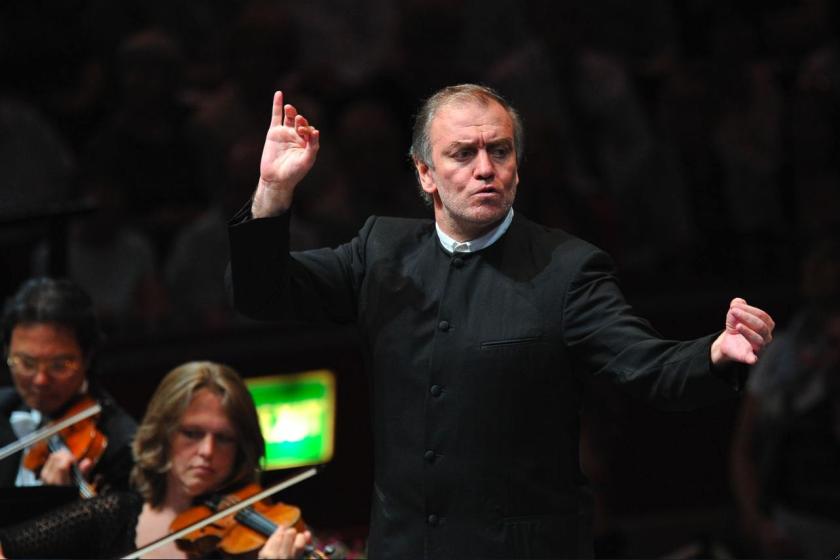It seemed odd on paper. Two Mahler symphonies? In one night? I don't think I'd ever seen that. Last night's Prom showed why not. While Valery Gergiev's second half Mahler Five saw the stage transfigured into a writhing sea of bodies and the air filled with an epic sound, his first half starter, Mahler Four, fell flat on its face. One was a performance; the other was a rehearsal to a performance.
It's no wonder really. The World Orchestra for Peace, the king of scratch bands, made up of concert masters and principals from the leading orchestras of the world, last met in September 2009. Besides, anyone who's experienced any part of Gergiev's Mahler cycle with the London Symphony Orchestra over the past two years will know that Gergiev is no master Mahlerian. His Mahler can entertain, intermittently excite, interest, perhaps intrigue, rarely surprise, and never move. And Mahler without emotion is not worth getting out of bed for.
So, at first, one put the lack of spark in the Mahler Four down to this: to Gergiev's track record and orchestral cobwebs. The lack of poise or éclat was just as it had been with his Mahler Four with the LSO. Each and every portamento and ritenuto - magical, curvy slides in tempo or tone - were delivered with as much grace as a 12-year-old's plotting of a parabola. Ensemble was hesitant, as if this assortment of master instrumentalists were still getting the measure of each other, none of them really willing to give it any welly unless explicit or easy - cue plenty of unnecessary Devon-creamy vibbing.
Individual contributions - the fantastic bite from the leader of the orchestra Rainer Kühl (of the Vienna Phil), limpid doodlings from LPO flautist Jaime Martin and some fine singing from Camilla Tilling - were better. But all ensemble energy was being expended on shifting the orchestra jerkily up and down this Austrian roller coaster, through the clouds (where Gergiev felt more comfortable) and the sun, not on creating any kind of cogent narrative. Consequently, the climax in the third movement came as an unwelcome, sickly surprise: an undeserving payoff.
Then came an interval and an orchestra transformed. We couldn't have got a more accurate response to Mahler's instructions - "Plotzlich schneller. Leidenshcaftlich. Wild" ("Faster suddenly. Passionate. Wild") - to unleash the proverbial dogs in the First Movement. Or a more realistic evocation of the way that this funeral march gets sucked into its own heavy, anxious tread, like that of a struggling man in quicksand. And what a demonic final sforzando pizzicato from the strings, a little unnecessary but very dramatic.
The strings dug deep in the stormy second movement. The trumpets, pitching the orchestra into glorious, warm, sun-drenched ocean swells, took on an extraordinary Russian colouring with Mariinsky principal, Timur Martynov, at the helm - even more notable in the final movement, where the brass became the sound and body of a mighty orthodox male choir. There was a soulfulness to a lot of the section playing. The cellos were fearsome, frightening, wild. The bassoons, another staple of the Russian musical diet, lurked in the shadows with great menace. The horns were sweet but a little overshadowed in the Scherzo, always appearing to be lead, like a herd, and not to be leading.
The Adagietto was soppy and sloppy and wonderful, with lashings of portamento. And the seat-of-the-pants gallop to the end laid to rest any early concerns about the unity of this band. In the Allegro giocoso they were as thick as thieves, as tight an ensemble as an Olympic syncopated swimming team, and offering us fresh visions of great colour and energy to the tumbling finish. This wasn't a Mahler performance about the eternal but about the moment. And in Gergiev's hands every moment was vital.














Comments
Add comment